Readings Newsletter
Become a Readings Member to make your shopping experience even easier.
Sign in or sign up for free!
You’re not far away from qualifying for FREE standard shipping within Australia
You’ve qualified for FREE standard shipping within Australia
The cart is loading…






Shifting from the idea that our current 'environmental question' arises from the history of metaphysics and its focus on 'Being' over 'Life'-and the attendant explorations of the thought of Heidegger and Heraclitus-this book unfolds a philosophical and sociological proposal for transitioning toward the sustainability of life.
With a focus on the imaginaries of life of indigenous peoples, it moves from political ecology to a political ontology, centered on the territorial, cultural, and existential rights of various peoples of the Earth. Arguing for an environmental rationality founded on three principles-the diversity of life, a politics of difference, and an ethics of otherness-it calls for a dialogue of knowledge in a world of manifold worlds, for an historical transition toward sustainability of life on our planet.
It will therefore appeal to scholars of sociology, philosophy, and political theory working on questions of social and environmental justice, sustainability, and alternatives to capitalism.
$9.00 standard shipping within Australia
FREE standard shipping within Australia for orders over $100.00
Express & International shipping calculated at checkout
Shifting from the idea that our current 'environmental question' arises from the history of metaphysics and its focus on 'Being' over 'Life'-and the attendant explorations of the thought of Heidegger and Heraclitus-this book unfolds a philosophical and sociological proposal for transitioning toward the sustainability of life.
With a focus on the imaginaries of life of indigenous peoples, it moves from political ecology to a political ontology, centered on the territorial, cultural, and existential rights of various peoples of the Earth. Arguing for an environmental rationality founded on three principles-the diversity of life, a politics of difference, and an ethics of otherness-it calls for a dialogue of knowledge in a world of manifold worlds, for an historical transition toward sustainability of life on our planet.
It will therefore appeal to scholars of sociology, philosophy, and political theory working on questions of social and environmental justice, sustainability, and alternatives to capitalism.